Sual | |
|---|---|
| Municipality of Sual | |
 Street in Sual | |
 Flag  Seal | |
 Map of Pangasinan with Sual highlighted | |
OpenStreetMap | |
.svg.png.webp) Sual Location within the Philippines | |
| Coordinates: 16°03′58″N 120°05′45″E / 16.0661°N 120.0958°E | |
| Country | Philippines |
| Region | Ilocos Region |
| Province | Pangasinan |
| District | 1st district |
| Founded | May 20, 1805 |
| Barangays | 19 (see Barangays) |
| Government | |
| • Type | Sangguniang Bayan |
| • Mayor | Liseldo D. Calugay |
| • Vice Mayor | Dioneil G. Caburao |
| • Representative | Arnold D. Celeste |
| • Municipal Council | Members |
| • Electorate | 31,640 voters (2022) |
| Area | |
| • Total | 130.16 km2 (50.26 sq mi) |
| Elevation | 77 m (253 ft) |
| Highest elevation | 387 m (1,270 ft) |
| Lowest elevation | 0 m (0 ft) |
| Population (2020 census)[3] | |
| • Total | 39,091 |
| • Density | 300/km2 (780/sq mi) |
| • Households | 10,084 |
| Economy | |
| • Income class | 1st municipal income class |
| • Poverty incidence | 10.10 |
| • Revenue | ₱ 409.6 million (2020) |
| • Assets | ₱ 2,678 million (2020) |
| • Expenditure | ₱ 308.7 million (2020) |
| • Liabilities | ₱ 1,240 million (2020) |
| Service provider | |
| • Electricity | Central Pangasinan Electric Cooperative (CENPELCO) |
| Time zone | UTC+8 (PST) |
| ZIP code | 2403 |
| PSGC | |
| IDD : area code | +63 (0)75 |
| Native languages | Pangasinan Ilocano Tagalog |
Sual, officially the Municipality of Sual (Pangasinan: Baley na Sual; Ilocano: Ili ti Sual; Tagalog: Bayan ng Sual), is a 1st class municipality in the province of Pangasinan, Philippines. According to the 2020 census, it has a population of 39,091 people.[3]
The Philippines largest coal power plant, the 1200 megawatt Sual Power Station, is located in this municipality. It used to be owned by Mirant Services LLC.
Sual is one of the towns where the Spanish galleon brought their goods to trade.
Sual is 25 kilometres (16 mi) from Lingayen and 231 kilometres (144 mi) from Manila.
History
Sual used to be a part of a town called San Isidro Labrador de Tobuang (now called Labrador). However Sual would separate from this town when an issue was decreed by the Spanish Governor General Rafael Maria de Aguilar. In May 2019, Liseldo D.Q. Calugay, after a landslide victory, end the 15-year reign of the Arcinue clan. Naval Base Lingayen built a PT boat base at Sual in 1945.
Maritime issues
On January, 2008, Bolinao Mayor Alfonso Celeste said the local government will file damage suit against Indonesian owners of the barge APOL 3003. The University of the Philippines Marine Science Institute (UPMSI) stated that the environmental damage was PHP54.9 million. The barge towed by a tug boat from Indonesia to the power plant in Sual on November 27 when Typhoon Mina destroyed its anchor and rope, then hurled it to Ilog Malino reef, spilling 95% of its coal cargo. The hard coal spill spread to 33 hectares (82 acres) of coral and sea grass areas.[5]
Geography
Barangays
Sual is politically subdivided into 19 barangays. Each barangay consists of puroks and some have sitios.
- Baquioen
- Baybay Norte
- Baybay Sur
- Bolaoen
- Cabalitian
- Calumbuyan
- Camagsingalan
- Caoayan
- Capantolan
- Macaycayawan
- Paitan East
- Paitan West
- Pangascasan
- Poblacion
- Santo Domingo
- Seselangen
- Sioasio East
- Sioasio West
- Victoria
Climate
| Climate data for Sual, Pangasinan | |||||||||||||
|---|---|---|---|---|---|---|---|---|---|---|---|---|---|
| Month | Jan | Feb | Mar | Apr | May | Jun | Jul | Aug | Sep | Oct | Nov | Dec | Year |
| Mean daily maximum °C (°F) | 31 (88) |
31 (88) |
31 (88) |
33 (91) |
32 (90) |
32 (90) |
30 (86) |
30 (86) |
30 (86) |
31 (88) |
31 (88) |
31 (88) |
31 (88) |
| Mean daily minimum °C (°F) | 21 (70) |
21 (70) |
22 (72) |
24 (75) |
24 (75) |
24 (75) |
23 (73) |
23 (73) |
23 (73) |
23 (73) |
23 (73) |
22 (72) |
23 (73) |
| Average precipitation mm (inches) | 5.1 (0.20) |
11.6 (0.46) |
21.1 (0.83) |
27.7 (1.09) |
232.9 (9.17) |
350.8 (13.81) |
679.8 (26.76) |
733.1 (28.86) |
505 (19.9) |
176.6 (6.95) |
67.2 (2.65) |
17.7 (0.70) |
2,828.6 (111.38) |
| Average rainy days | 3 | 3 | 3 | 4 | 14 | 18 | 23 | 25 | 22 | 15 | 8 | 4 | 142 |
| Source: World Weather Online[6] | |||||||||||||
Demographics
| Year | Pop. | ±% p.a. |
|---|---|---|
| 1903 | 2,986 | — |
| 1918 | 4,286 | +2.44% |
| 1939 | 6,396 | +1.92% |
| 1948 | 7,458 | +1.72% |
| 1960 | 9,412 | +1.96% |
| 1970 | 12,528 | +2.90% |
| 1975 | 14,367 | +2.78% |
| 1980 | 15,796 | +1.91% |
| 1990 | 19,594 | +2.18% |
| 1995 | 20,929 | +1.24% |
| 2000 | 25,832 | +4.62% |
| 2007 | 29,925 | +2.05% |
| 2010 | 31,216 | +1.55% |
| 2015 | 34,149 | +1.73% |
| 2020 | 39,091 | +2.69% |
| Source: Philippine Statistics Authority[7][8][9][10] | ||
Economy
Government
Local government
Sual, belonging to the first congressional district of the province of Pangasinan, is governed by a mayor designated as its local chief executive and by a municipal council as its legislative body in accordance with the Local Government Code. The mayor, vice mayor, and the councilors are elected directly by the people through an election which is being held every three years.
Elected officials
| Position | Name |
|---|---|
| Congressman | Arnold F. Celeste |
| Mayor | Liseldo De. Calugay |
| Vice-Mayor | Dioneil G. Caburao |
| Councilors | Dionisio G. Caburao Jr. |
| John Christopher A. Arcinue | |
| Raymundo C. Edrosolan | |
| Alex I. Osana | |
| Danilo B. Vinluan | |
| Jenibelle Ayra C. Tomagoy | |
| Gregorio G. Garcia Jr. | |
| Michael John C. Millan | |
Tourism
- St. Peter the Martyr Parish Church
- Limahong Beach Resort in Cabalitian island
Gallery
 Welcome sign
Welcome sign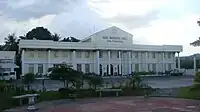 Sual Municipal Hall
Sual Municipal Hall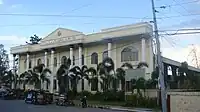 Sual Sports and Civic Center
Sual Sports and Civic Center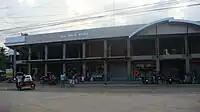 Sual Public Market (Poblacion)
Sual Public Market (Poblacion)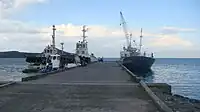 Tugboats and small vessels in the Fish Port Complex
Tugboats and small vessels in the Fish Port Complex San Pedro Martir Parish Church (Poblacion)
San Pedro Martir Parish Church (Poblacion)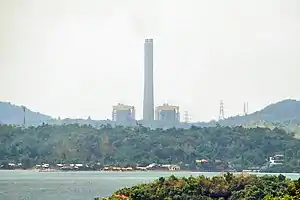
References
- ↑ Municipality of Sual | (DILG)
- ↑ "2015 Census of Population, Report No. 3 – Population, Land Area, and Population Density" (PDF). Philippine Statistics Authority. Quezon City, Philippines. August 2016. ISSN 0117-1453. Archived (PDF) from the original on May 25, 2021. Retrieved July 16, 2021.
- 1 2 Census of Population (2020). "Region I (Ilocos Region)". Total Population by Province, City, Municipality and Barangay. Philippine Statistics Authority. Retrieved 8 July 2021.
- ↑ "PSA Releases the 2018 Municipal and City Level Poverty Estimates". Philippine Statistics Authority. 15 December 2021. Retrieved 22 January 2022.
- ↑ Inquirer.net, Bolinao to sue barge owners for coal spill Archived 2009-03-12 at the Wayback Machine
- ↑ "Sual, Pangasinan: Average Temperatures and Rainfall". World Weather Online. Retrieved 31 October 2015.
- ↑ Census of Population (2015). "Region I (Ilocos Region)". Total Population by Province, City, Municipality and Barangay. Philippine Statistics Authority. Retrieved 20 June 2016.
- ↑ Census of Population and Housing (2010). "Region I (Ilocos Region)" (PDF). Total Population by Province, City, Municipality and Barangay. National Statistics Office. Retrieved 29 June 2016.
- ↑ Censuses of Population (1903–2007). "Region I (Ilocos Region)". Table 1. Population Enumerated in Various Censuses by Province/Highly Urbanized City: 1903 to 2007. National Statistics Office.
{{cite encyclopedia}}: CS1 maint: numeric names: authors list (link) - ↑ "Province of Pangasinan". Municipality Population Data. Local Water Utilities Administration Research Division. Retrieved 17 December 2016.
- ↑ "Poverty incidence (PI):". Philippine Statistics Authority. Retrieved December 28, 2020.
- ↑ "Estimation of Local Poverty in the Philippines" (PDF). Philippine Statistics Authority. 29 November 2005.
- ↑ "2003 City and Municipal Level Poverty Estimates" (PDF). Philippine Statistics Authority. 23 March 2009.
- ↑ "City and Municipal Level Poverty Estimates; 2006 and 2009" (PDF). Philippine Statistics Authority. 3 August 2012.
- ↑ "2012 Municipal and City Level Poverty Estimates" (PDF). Philippine Statistics Authority. 31 May 2016.
- ↑ "Municipal and City Level Small Area Poverty Estimates; 2009, 2012 and 2015". Philippine Statistics Authority. 10 July 2019.
- ↑ "PSA Releases the 2018 Municipal and City Level Poverty Estimates". Philippine Statistics Authority. 15 December 2021. Retrieved 22 January 2022.
- ↑ "2019 National and Local Elections" (PDF). Commission on Elections. Retrieved March 6, 2022.